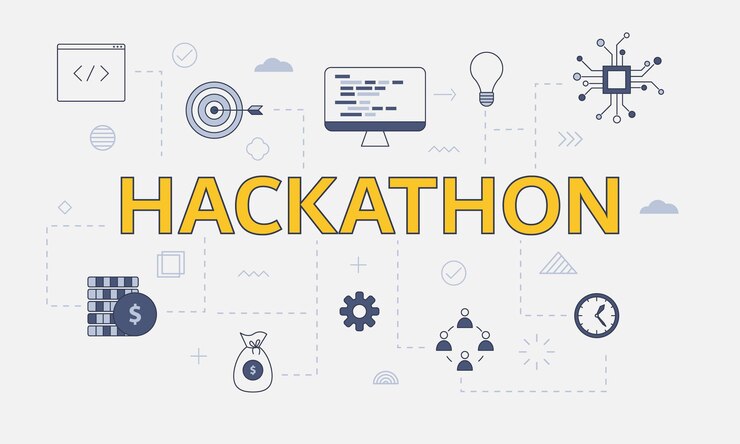A hackathon is an event in which many people come together to engage in collaborative computer programming. Hackathons are typically focused on building software, although they can also be focused on hardware or other areas. Hackathons are often organized by companies or other organizations to encourage innovation and creativity, and they can be a great way for programmers and other technologists to work on new projects and ideas in a fast-paced, highly collaborative environment. Hackathons can last anywhere from a few hours to a few days, and they often feature prizes and other incentives for the most successful teams or projects.

Hackathons are characterized by different aspects and attributes, some of which are co-location, team-based, incentives, objective, and time.
Co-location: Participants meet in a physical space, often areas unused during the weekend. While a few hackathons allow some level of virtual participation, almost all require physical co-location of some kind. The emphasis hackathons place on physical co-location differentiates them from other means of managing crowd-based human capital, such as traditional crowdsourcing or flash teams.
Team-based: Although applications, invitations, and decisions to attend a hackathon are primarily individual, once the hackathon begins, work is done in teams. This co-creation attribute of hackathons is distinct from many other forms of open, crowd-based interaction, in which work is typically broken down into individualized components and individual work is the norm.
Incentives: Hackathons often feature prizes and other incentives for the most successful teams or projects. Most of them close with a science-fair-style exposition of projects that includes participants conversing directly with celebrity judges about their projects. Then the winners are chosen to give a live demo of their project on stage and take away modest awards that normally are nothing more than repute and recognition.
Objective: In addition to encouraging innovation and creativity, hackathons may also have other objectives, such as: Providing a platform for programmers and other technologists to work on new projects and ideas; Identifying and attracting talented individuals who may be interested in working for the company or organization hosting the hackathon; Showcasing the capabilities of the company or organization hosting the hackathon; Promoting the use of specific technologies or platforms; Solving a specific problem or addressing a particular challenge.
Time: We can define a hackathon as a marathon, not a magic time project. Hackathons are too short to allow participants to focus only on what is going on at the hackathon. Unlike crowd-based contests and boot camps, which are typically done in one´s spare time, a hackathon is compressed into one intense, all-encompassing event.
| Crowd-based Contests | Hackathons | Bootcamps | |
| Location | Virtual | Physically co-located | Physically co-present |
| Working Unit | Individual | Team | Community |
| Incentives | Monetary | Recognition, ownership, or output | Expertise/”skill-up” |
| Objective | Find innovative answers to a highly specific problem | Develop a working prototype that people can see, touch, and experience that addresses a broad goal | Learn skills, knowledge, expertise, capabilities |
| Time | 12 weeks or more | 24 hours to 5 days | 6 to 12 weeks |
How did Hackathons appear?
The concept of a hackathon can be traced back to 1999, when OpenAI co-founder and entrepreneur Sunil Paul organized the first “hackathon” at the annual Pajama Program Charity Hackathon. The event was designed to bring together programmers and other technologists to work on new projects and ideas in a fast-paced, highly collaborative environment.
Since then, the concept of the hackathon has spread and evolved, with hackathons being organized by a wide range of companies, organizations, and institutions around the world. Hackathons are now a common feature of the tech industry, with many companies and organizations hosting their own hackathons to encourage innovation and creativity, as well as to identify and attract talented individuals.
The nature of the host could be different, it could be corporate, civic, or collegiate.
Corporate hackathons are sponsored by for-profit corporations, they usually take the form of internal gatherings of employees of the same company and are organized onsite. Employees can access the corporation´s substantial resources to find their own solutions.
Civic hackathons, this kind of hackathons are mission-driven and are sponsored or hosted by non-profits or local- or federal governments and aim to generate collective action. In terms of government hackathons, what might take months to do in government may only take a weekend to do when the right people are in the same space together.
Collegiate hackathons are sponsored or hosted by colleges or universities and usually occur in the spring or fall. They can be quite large, with schools (universities) having 400-500 students participating each year. The organizers of collegiate hackathons are often students themselves.
Hackathons in the Future
It is difficult to predict exactly how hackathons will evolve in the future, but it is likely that they will continue to be an important part of the tech industry and a popular way for companies and organizations to encourage innovation and creativity.
One possibility is that hackathons will become more diverse, with events being organized for a wider range of industries and sectors, and for a wider range of goals and objectives. Hackathons may also become more inclusive, with a greater focus on diversity and inclusion in the participants and projects involved.
In terms of format, it is likely that hackathons will continue to be held both in person and online, with a greater emphasis on virtual and remote participation. This may involve the use of new technologies and platforms that enable real-time collaboration and communication between participants, regardless of their location.
Overall, the future of hackathons is likely to be characterized by continued innovation and evolution, as organizations and individuals seek new and creative ways to use hackathons to drive innovation and solve complex problems.